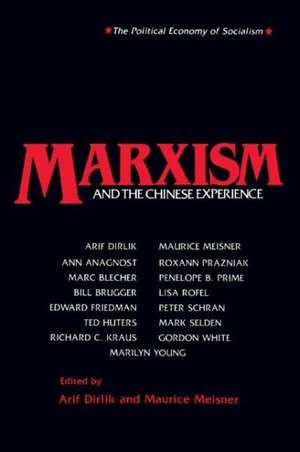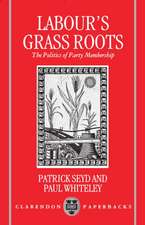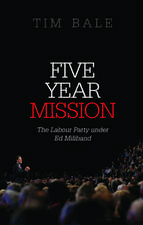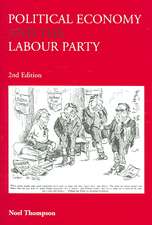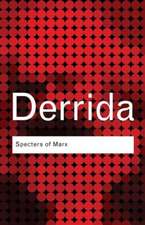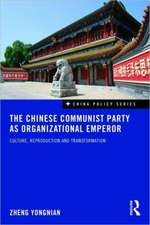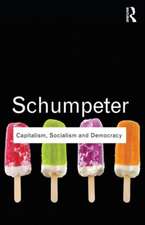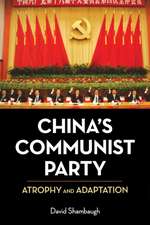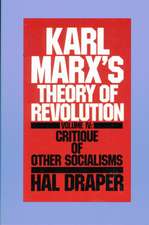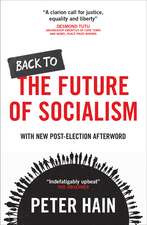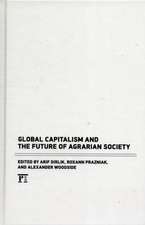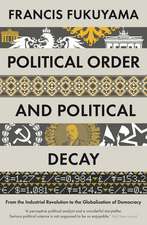Marxism and the Chinese Experience: Issues in Contemporary Chinese Socialism
Autor Arif Dirlik, Maurice Meisneren Limba Engleză Paperback – 31 ian 1989
| Toate formatele și edițiile | Preț | Express |
|---|---|---|
| Paperback (1) | 369.73 lei 43-57 zile | |
| Taylor & Francis – 31 ian 1989 | 369.73 lei 43-57 zile | |
| Hardback (1) | 1000.27 lei 43-57 zile | |
| Taylor & Francis – 31 ian 1989 | 1000.27 lei 43-57 zile |
Preț: 369.73 lei
Nou
Puncte Express: 555
Preț estimativ în valută:
70.75€ • 74.05$ • 58.88£
70.75€ • 74.05$ • 58.88£
Carte tipărită la comandă
Livrare economică 31 martie-14 aprilie
Preluare comenzi: 021 569.72.76
Specificații
ISBN-13: 9780873325462
ISBN-10: 087332546X
Pagini: 396
Dimensiuni: 152 x 229 x 22 mm
Greutate: 0.45 kg
Ediția:New.
Editura: Taylor & Francis
Colecția Routledge
Locul publicării:Oxford, United Kingdom
ISBN-10: 087332546X
Pagini: 396
Dimensiuni: 152 x 229 x 22 mm
Greutate: 0.45 kg
Ediția:New.
Editura: Taylor & Francis
Colecția Routledge
Locul publicării:Oxford, United Kingdom
Cuprins
Part 1 Introduction; Chapter 1 Politics, Scholarship, and Chinese Socialism, Arif Dirlik, Meisner Maurice; Chapter 2 Revolutionary Hegemony and the Language of Revolution: Chinese Socialism between Present and Future, Arif Dirlik; Part 2 Political Economy; Chapter 3 Mao Zedong and The Political Economy of Chinese Development, Mark Selden; Chapter 4 On the Organization of Production under Socialism, Peter Schran; Chapter 5 Marx, Mao, and Deng on the Division of Labor in History, Maurice Meisner; Chapter 6 Mao, Science, Technology, and Humanity, Bill Brugger; Chapter 7 Socialism and Economic Development: The Politics of Accumulation in China, Penelope B. Prime; Chapter 8 Restructuring the Working Class: Labor Reform in Post-Mao China, Cordon White; Part 3 Social Relations, Political Power, and Culture; Chapter 9 Theorizing the Democratization of China’s Leninist State, Edward Friedman; Chapter 10 Structural Change and the Political Articulation of Social Interest in Revolutionary and Socialist China, Marc Blecher; Chapter 11 Prosperity and Counterprosperity: The Moral Discourse on Wealth in Post-Mao China, Ann Anagnost; Chapter 12 Hegemony and Productivity: Workers in Post-Mao China, Lisa Rofel; Chapter 13 Chicken Little in China: Some Reelections on Women, Marilyn Young; Chapter 14 Feminist Humanism: Socialism and Neofeminism in the Writings of Zhang Jie, Roxann Prazniak; Chapter 15 The Lament of Astrophysicist Fang Lizhi: China’s Intellectuals in a Global Context, Richard C. Kraus; Chapter 16 Between Praxis and Essence: The Search for Cultural Expression in the Chinese Revolution, Ted Huters; Part 4 Conclusions; Chapter 17 The Deradicalization of Chinese Socialism, Maurice Meisner; Chapter 18 Postsocialism? Reflections on “Socialism with Chinese Characteristics”, Arif Dirlik;
Notă biografică
Arif Dirlik, Ann Anagnost, Marc Blecher, Bill Brugger, Edward Friedman, Ted Huters, Richard C. Kraus
Descriere
These essays consider the implications for Chinese socialism of the repudiation of the Cultural Revolution and the legacy of Mao Zedong as well as the meaning of the new definition and direction Mao's successors have given socialism.
